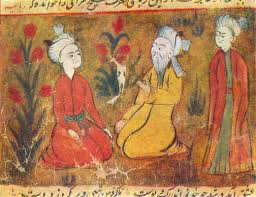Amir Khusrau

- 03 Mar 2025
In News:
In his address to the 25th edition of Jahan-e-Khusrau at New Delhi’s Sunder Nursery, Prime Minister Narendra Modi described the annual music festival that commemorates the Sufi poet-musician Amir Khusrau as imbued with the “fragrance of the soil of Hindustan”.
Introduction
- Amir Khusrau, a 13th-century poet, musician, and scholar, is a prominent figure in India’s cultural history.
- Known as Tuti-yi-Hind (the Parrot of India), Khusrau’s contributions spanned literature, music, and the Sufi spiritual tradition.
- Revered for his role in shaping India’s syncretic culture, blending Persian, Turkic, and Indian elements.
Early Life and Background
- Born in 1253 in Patiyali, Uttar Pradesh, to a Turkic father and Indian Muslim mother.
- His family migrated to India due to Mongol invasions of Transoxiana.
- Grew up under the patronage of the Delhi Sultanate, serving five rulers: MuizuddinQaiqabad, JalaluddinKhalji, AlauddinKhalji, Qutbuddin Mubarak Shah, and GhiyasuddinTughlaq.
Literary Contributions
- Wrote in Persian and Hindavi, blending Turkic, Persian, and Indian traditions.
- Contributed significantly to the development of Hindavi, the precursor to modern Hindi and Urdu.
- Works include Divans (poetry collections), Mathnawis (narrative poems), and treatises.
- Advocated for Hindu-Muslim unity, promoting syncretic culture (Ganga-JamuniTehzeeb).
- Known for writing riddles, proverbs, and playful verses, which made literature accessible to the common people.
- Praised Hindu philosophical thought in his works, such as MasnaviNuhSiphir.
Musical Contributions
- Credited with creating several ragas, developing khayal (a classical Hindustani music form), and tarana (rhythmic vocal composition).
- Played a significant role in popularizing qawwali, a devotional Sufi music genre, by blending Persian, Arabic, and Indian musical traditions.
- Believed to have invented the sitar and tabla, though evidence is debated.
- Famous qawwalis include ChhaapTilak, Zehal-e-Maskeen, and Sakal Ban PhoolRahiSarson.
Role in the Delhi Sultanate
- Served as a court poet for at least five Delhi Sultans over five decades, a testament to his literary excellence.
- His compositions were vital in enhancing the Sultan’s political and cultural legitimacy.
- Sultan JalaluddinKhalji bestowed upon him the title Amir in recognition of his contributions to poetry.
Spiritual and Sufi Influence
- A devoted disciple of the Chishti Sufi saint NizamuddinAuliya, whose teachings on love and devotion to God deeply influenced Khusrau’s poetry and music.
- Balanced his role as a court poet with devotion to the Sufi order, bridging the worlds of royal courts and spiritual practices.
- His deep spiritual connection to NizamuddinAuliya is immortalized by their shared burial site in Delhi.
Sufism in India
- Sufism is the mystical and spiritual dimension of Islam, emphasizing love, devotion, and inner purification.
- Sufism emerged as a reaction to the rigidity of institutionalized religion and developed alongside India’s Bhakti movement.
- Key Sufi Orders in India:
- Chishti Order: The most influential in India, founded by KhwajaMoinuddin Chishti, focusing on love, devotion, and harmony.
- Suhrawardi Order: Focused on combining religious knowledge with mysticism.
- Naqshbandi Order: Opposed innovations like musical recitals and pilgrimages.
- Rishi Order: Based in Kashmir, drawing from the Shaivite bhakti tradition.
Impact of Sufism in India
- Sufism promoted religious tolerance, social reform, and a deep connection to spirituality.
- It attracted marginalized communities and weakened caste hierarchies.
- Sufi shrines and dargahs became pilgrimage sites for spiritual blessings.
- Influenced Indian music (especially qawwali) and literature, with poets like Bulleh Shah and Sultan Bahu.
- Promoted Sulh-e-Kul (peace with all), a concept that influenced Akbar’s religious tolerance policies.
Khusrau’s Lasting Legacy
- Amir Khusrau’s influence extends across literature, music, and spirituality in India.
- His poetry and music are celebrated today in both sacred and secular contexts.
- His works laid the foundation for the development of Urdu and Hindi literature.
- Khusrau’s teachings on Hindu-Muslim unity and cultural synthesis remain relevant in contemporary India.
